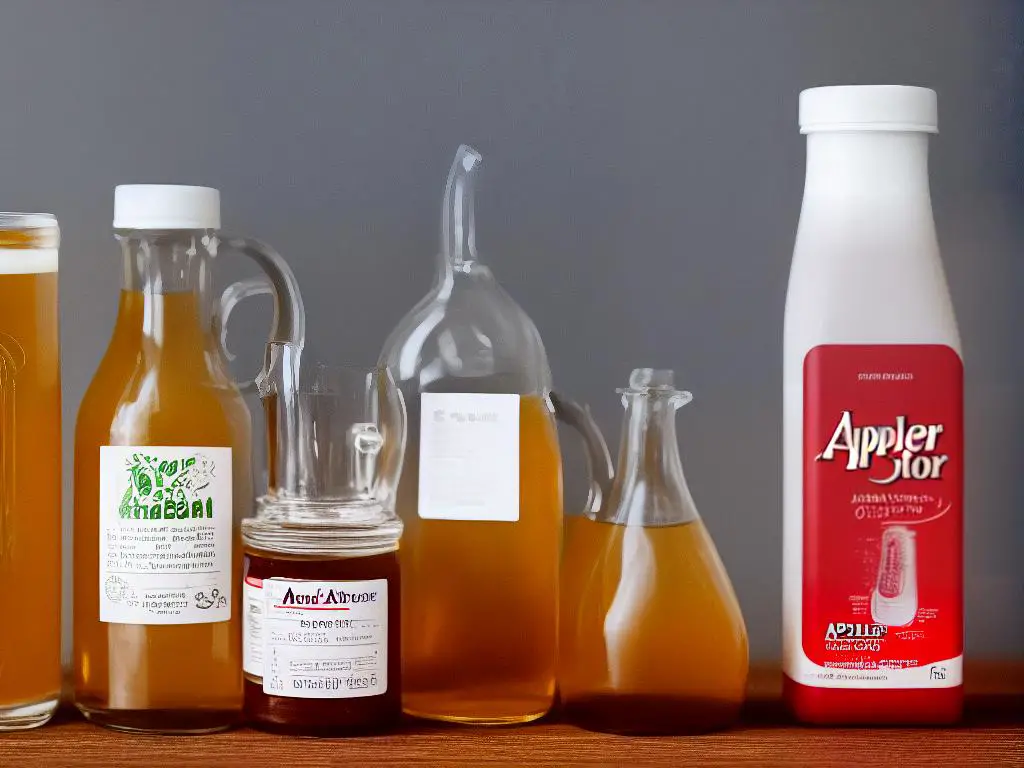As savvy consumers, it’s essential for us to stay informed about the potential interactions between popular natural remedies and traditional medications. In this article, we’ll explore the ins and outs of apple cider vinegar and aspirin, covering everything from their individual health benefits to potential risks and expert advice when combining the two.
Understanding Apple Cider Vinegar
Apple cider vinegar is a popular natural remedy that has been used for centuries for various health benefits and household purposes. It is made from fermented apple juice, which contains acetic acid, vitamins, minerals, and beneficial enzymes. Many people incorporate apple cider vinegar into their daily routines due to its potential health benefits, such as aiding in digestion, managing blood sugar levels, and supporting weight loss. There is also a growing interest in the possibility of combining apple cider vinegar with other substances, such as aspirin, for further health benefits or to address specific concerns.
Aspirin, also known as acetylsalicylic acid, is a commonly used medication to treat pain, inflammation, and fever. It is also used as a preventive measure for heart attacks and strokes due to its ability to thin the blood and prevent blood clots. When considering combining aspirin with apple cider vinegar, it is important to take into account their individual properties and potential interactions. Apple cider vinegar may have blood-thinning properties, similar to how aspirin works. Therefore, the combination of both substances might increase the risk of bleeding for some individuals.
Apple cider vinegar has been touted for its potential health benefits, including improved digestion, weight loss, and blood sugar regulation. However, it is important to note that this natural remedy is acidic and could cause erosion of tooth enamel and irritation of the gastrointestinal tract when consumed over a long period. Aspirin, a widely used over-the-counter medication, is known to provide relief from various ailments, such as pain, inflammation, and fever. This non-steroidal anti-inflammatory drug (NSAID) achieves this by inhibiting the production of certain chemicals called prostaglandins in the body, which cause pain and inflammation. Additionally, aspirin has blood-thinning properties, making it useful in preventing heart attacks and strokes in at-risk individuals. However, aspirin can also cause potential side effects, including stomach irritation, ulcers, and allergic reactions.

Understanding Aspirin
Considering that both apple cider vinegar and aspirin can cause irritation to the gastrointestinal tract, combining these two substances could potentially exacerbate these side effects. It is crucial to consult with a healthcare professional before incorporating apple cider vinegar into your routine, particularly if you are considering mixing it with medications like aspirin. A medical expert can help guide you in determining the appropriate dosage, frequency, and any potential risks based on your specific health needs and medical history. By taking the necessary precautions and following professional advice, you can make informed decisions when it comes to using apple cider vinegar and aspirin together.
Apple cider vinegar (ACV) is a popular home remedy and health supplement that many people use for various purposes such as weight management, digestive health, and blood sugar regulation. While ACV is generally considered safe for consumption, it is acidic in nature and may cause stomach irritation in some people, particularly when taken undiluted or in large quantities. Given its acidic properties, combining ACV with aspirin may increase the risk of stomach irritation or aggravate existing gastrointestinal issues.If you are considering using both aspirin and apple cider vinegar, it is important to consult with a healthcare professional who can determine if these substances are appropriate for your individual needs and if any potential interactions may occur. Healthcare providers can evaluate your health goals and provide guidance on the safety and efficacy of combining aspirin and apple cider vinegar. Remember that while both aspirin and ACV offer potential health benefits, they may not be suitable for everyone, especially when used in combination with certain medications or medical conditions. Always discuss your specific health needs with a qualified healthcare provider before making any changes to your routine.

Interactions between Apple Cider Vinegar and Aspirin
Apple cider vinegar, a popular natural remedy with a wide range of claimed health benefits such as improving digestion, regulating blood sugar levels, and boosting the immune system, and aspirin, a widely used medication for pain relief, fever reduction, and prevention of heart attacks and strokes, may not always be compatible. Potential interactions and side effects can occur when these two substances are taken together; thus, it is essential to consult with a healthcare professional to ensure their proper and safe use.
There is a concern that the acidic nature of apple cider vinegar may amplify the gastrointestinal side effects of aspirin. Aspirinated individuals often experience stomach upset, heartburn, or even ulcers. Adding apple cider vinegar to the mix could potentially exacerbate these symptoms by further irritating the stomach lining. Additionally, apple cider vinegar may interfere with the absorption of certain medications, including aspirin. This could potentially decrease the effectiveness of aspirin in alleviating pain or preventing heart attacks and strokes.
There are differing opinions on the safety of combining apple cider vinegar and aspirin, as both substances have blood-thinning properties that could potentially increase the risk of excessive bleeding if taken together. Additionally, they can both cause gastrointestinal irritation, which may be exacerbated by their combined use. It is generally safe for most people to consume small amounts of apple cider vinegar as part of a healthy diet, but exercising caution when combining it with medications like aspirin is recommended to prevent any unwanted interactions or side effects.

Expert Opinions on Combining Apple Cider Vinegar and Aspirin
Some medical professionals advise taking aspirin and apple cider vinegar at different times of the day to minimize potential interactions. However, it is crucial to consult with your healthcare provider, as they can take your medical history and specific needs into account when making recommendations. They may also consider possible interactions with other medications or supplements you might be taking. Exercise caution when combining any natural remedies or supplements with prescription or over-the-counter medications, and discuss your specific situation with your healthcare provider to determine the safest course of action. This advice is particularly relevant for individuals with pre-existing medical conditions, such as kidney or liver issues, or those taking other blood-thinning medications, as these factors may increase the risk of side effects and complications when using apple cider vinegar and aspirin together.

Throughout this article, we delved into the world of apple cider vinegar and aspirin, examining their potential benefits, uses, and side effects. We also investigated possible interactions between these two substances and sought expert opinions on their combined usage. While it’s crucial to remain educated on such topics, always consult with a healthcare professional before starting or altering your personal health regimen. Stay proactive in taking charge of your well-being!